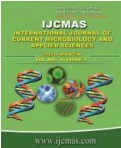


 National Academy of Agricultural Sciences (NAAS)
National Academy of Agricultural Sciences (NAAS)

|
PRINT ISSN : 2319-7692
Online ISSN : 2319-7706 Issues : 12 per year Publisher : Excellent Publishers Email : editorijcmas@gmail.com / submit@ijcmas.com Editor-in-chief: Dr.M.Prakash Index Copernicus ICV 2018: 95.39 NAAS RATING 2020: 5.38 |
Global climate change and increased climate variability are particularly likely to affect vector and vector-borne parasitic diseases. Climate change will affect the distribution and incidence of vector-borne parasitic diseases globally. Climate change, particularly global warming, is already altering habitat quality, species distributions, biodiversity and many essential ecosystem services. Arthropods are highly sensitive to changes in temperature and precipitation as they cannot regulate their own internal temperatures and are therefore critically dependent on climate for survival and development. Vector-borne diseases (VBDs) are among the major causes of morbidity and mortality in the world today affecting nearly half of the world’s population, the majority of who reside in developing countries located in the tropical and subtropical areas of the world. Improved surveillance and monitoring is needed so as to detect changes resulting from global climate and ecological change, both for the identification of immediately required action and to serve as the basis for developing predictive models. Predicting how the long-term distribution and prevalence of such important human and animal diseases will change in the face of global warming is a key challenge facing humans in the near future.
 |
 |
 |
 |
 |